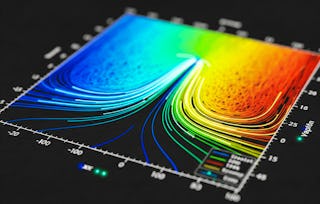This course will introduce the learner to information visualization basics, with a focus on reporting and charting using the matplotlib library. The course will start with a design and information literacy perspective, touching on what makes a good and bad visualization, and what statistical measures translate into in terms of visualizations. The second week will focus on the technology used to make visualizations in python, matplotlib, and introduce users to best practices when creating basic charts and how to realize design decisions in the framework. The third week will be a tutorial of functionality available in matplotlib, and demonstrate a variety of basic statistical charts helping learners to identify when a particular method is good for a particular problem. The course will end with a discussion of other forms of structuring and visualizing data.

Applied Plotting, Charting & Data Representation in Python

Applied Plotting, Charting & Data Representation in Python
This course is part of Applied Data Science with Python Specialization

Instructor: Christopher Brooks
Access provided by FutureX
207,023 already enrolled
6,284 reviews
What you'll learn
Describe what makes a good or bad visualization
Understand best practices for creating basic charts
Identify the functions that are best for particular problems
Create a visualization using matplotlb
Skills you'll gain
Details to know

Add to your LinkedIn profile
See how employees at top companies are mastering in-demand skills

Build your subject-matter expertise
- Learn new concepts from industry experts
- Gain a foundational understanding of a subject or tool
- Develop job-relevant skills with hands-on projects
- Earn a shareable career certificate

There are 4 modules in this course
In this module, you will get an introduction to principles of information visualization. We will be introduced to tools for thinking about design and graphical heuristics for thinking about creating effective visualizations. All of the course information on grading, prerequisites, and expectations are on the course syllabus, which is included in this module.
What's included
8 videos6 readings1 peer review1 app item1 discussion prompt
In this module, you will delve into basic charting. For this week’s assignment, you will work with real world CSV weather data. You will manipulate the data to display the minimum and maximum temperature for a range of dates and demonstrate that you know how to create a line graph using matplotlib. Additionally, you will demonstrate the procedure of composite charts, by overlaying a scatter plot of record breaking data for a given year.
What's included
7 videos2 readings1 peer review2 ungraded labs
In this module you will explore charting fundamentals. For this week’s assignment you will work to implement a new visualization technique based on academic research. This assignment is flexible and you can address it using a variety of difficulties - from an easy static image to an interactive chart where users can set ranges of values to be used.
What's included
6 videos3 readings2 peer reviews3 ungraded labs
In this module, then everything starts to come together. Your final assignment is entitled “Becoming a Data Scientist.” This assignment requires that you identify at least two publicly accessible datasets from the same region that are consistent across a meaningful dimension. You will state a research question that can be answered using these data sets and then create a visual using matplotlib that addresses your stated research question. You will then be asked to justify how your visual addresses your research question.
What's included
4 videos3 readings1 peer review2 ungraded labs
Earn a career certificate
Add this credential to your LinkedIn profile, resume, or CV. Share it on social media and in your performance review.
Instructor

Offered by
Why people choose Coursera for their career

Felipe M.

Jennifer J.

Larry W.

Chaitanya A.
Learner reviews
- 5 stars
67.10%
- 4 stars
23.16%
- 3 stars
6.22%
- 2 stars
1.97%
- 1 star
1.52%
Showing 3 of 6284
Reviewed on Mar 5, 2018
Very helpful to understand what it takes to make a scientific and sensible visual. Recommended for someone who is interested in learning data visualization and does not have a background.
Reviewed on Oct 1, 2017
it is a good course to help me have a glance to the data visualization area. However, I think I cannot learned a lot from the course and the homework is so easy that I haven't practice enough.
Reviewed on Jun 27, 2017
Good course to learned matplotlib and other Graphs libraries, but the course goes further than Python and also encourages the studies to create more meaningful and beautiful Graphic views.
Explore more from Data Science
¹ Some assignments in this course are AI-graded. For these assignments, your data will be used in accordance with Coursera's Privacy Notice.





